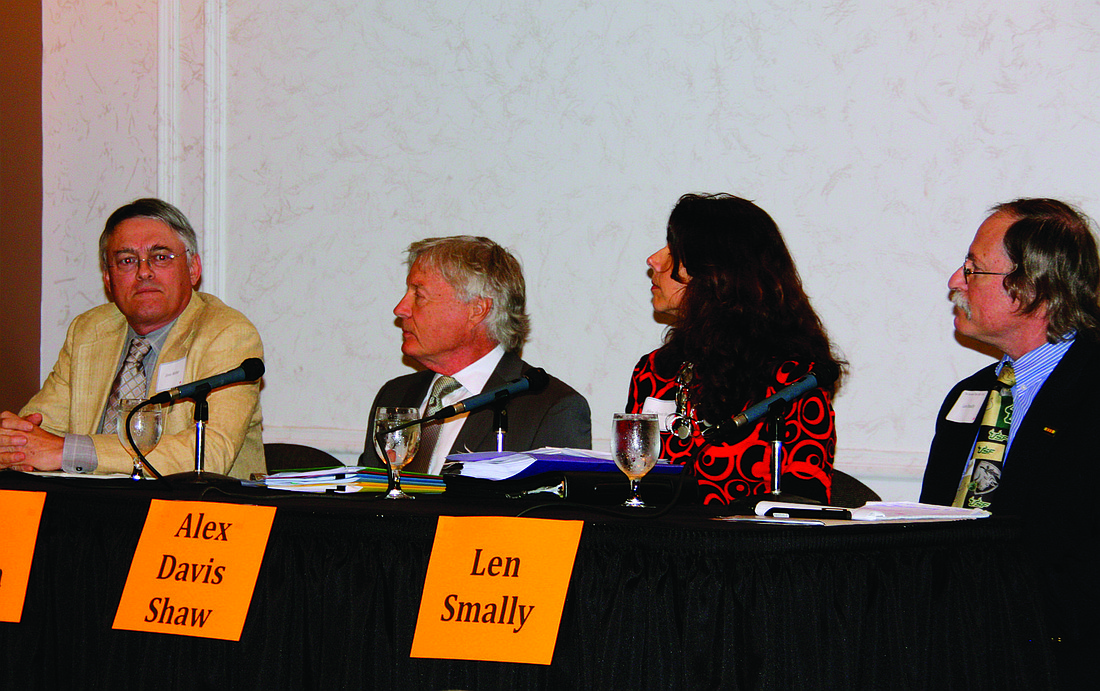- November 25, 2024
-
-
Loading

Loading

Camps on both sides of the Big Pass dredge debate dug in on their positions during a Tiger Bay meeting March 6.
Former County Environmental Services Director Rob Patten and environmental activist Jono Miller were originally set to square off against representatives of the U.S. Army Corps of Engineers in a potentially highly charged debate — referred to as “Sand Wars” in the Tiger Bay program — on the merits and potential risks of the Corps’ proposal to mine the Big Pass shoal to renourish Lido Beach.
The Friday before the debate, however, the Army backed out of the meeting. Sarasota City Engineer Alex DavisShaw and Len Smally, former director of public works for the city of Longboat Key, stepped up to defend the project on behalf of the city of Sarasota.
New College Professor Dr. Frank Alcock, the event’s moderator, said the Army Corps announced its decision not to attend the debate, claiming it still had to finalize the details of its plan before it defended its merits in a public forum. Miller questioned the Corps’ absence Thursday, claiming the Corps should be prepared to defend a project it began working on in 1997.
“The Corps has left the city standing at the altar,” Miller said.
Milan Mora, U.S Army Corps of Engineers project manager, said his contingent did not attend the debate due to both personal reasons and incomplete data.
“The modeling will not be done until late April, so there’s nothing new to talk about,” Mora said. “How can you oppose a project when the data is not even out for review?”
Miller and Patten said the Corps’ plans had not been properly vetted by area stakeholders and community groups.
“There’s a huge array of stakeholders that have not been heard from,” Patten said. “This is potentially a reckless act. It will impact all Sarasota residents.”
DavisShaw defended the merits of the project, calling it a necessity for the safety of Lido Beach in the event of a hurricane. She pointed to a decade of scientific studies that verify its minimal impact on the environment.
DavisShaw added that contingency plans were being included in the Corps’ final proposal, outlining possible courses of action should the project result in unintended consequences to nearby Siesta Key.
“As part of this project, not only will they (Army Corps) have to monitor Lido, but Siesta and Big Pass, as well,” DavisShaw said.
Patten said the contingency plans would likely do little to reverse whatever damage the dredge might produce.
“You don’t get a do-over in this case,” Patten said.
Smally defended the scientific studies used to justify the project, adding that Lido Beach was in dire need of renourishment. He also referenced the Army Corps’ offer to pay 60% of the project’s total $22 million cost with federal funding.
“It would be a shame if anything happened to derail this project,” Smally said, “because it’s a gift from the Corps.”
St. Armands residents back Lido renourishment
Seemingly adding to a growing divide between north and south barrier islands, the St. Armands Residents Association is fully endorsing the proposed renourishment of Lido Key.
At the organization’s annual meeting and dinner, held March 6 at the Sarasota Yacht Club, Sarasota City Engineer Alex DavisShaw gave a presentation regarding the renourishment project, which would take sand from Big Pass to replenish Lido Beach. DavisShaw filled in for Army Corps of Engineers representatives, who were scheduled to speak but dropped out the week before the event.
The reception from St. Armands residents was positive. Residents Association President Hugh Fiore said the group was 110% in favor of the renourishment because the group feels the beach serves as an important asset to the nearby neighborhoods.
“It one, affects our property values — having a vibrant beach affects the surrounding values,” Fiore said. “It also affects our quality of life, because many of our residents like to walk the beach.”
Fiore, who has lived on St. Armands since 1977, said the beach was the economic engine that ensured the success of nearby businesses. If the beach isn’t preserved, he said, the effects would be devastating.
“There would be no hotels if they didn’t have a beach to come to,” Fiore said. “It drives the economic prosperity of the shops on St. Armands Circle.”
Fiore also downplayed the nature of the conflicting sides of the argument surrounding the project. He felt that, outside of a small group on Siesta Key, there is not significant backlash against the proposed dredging of Big Pass.
“I think it’s a limited number of folks who are trying to make a sand war out of it,” Fiore said.
Ultimately, he said, the project would be continuously monitored by the Army Corps to ensure that the dredging of sand from Big Pass — sand that largely traveled down from Lido Key to begin with — did not negatively impact Siesta Key. Based on that, he felt the proposal should not be particularly controversial.
“This isn’t an earth-shattering deal here,” Fiore said.
— David Conway
Contact Nolan Peterson at [email protected]